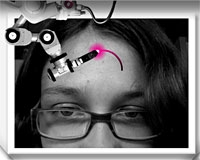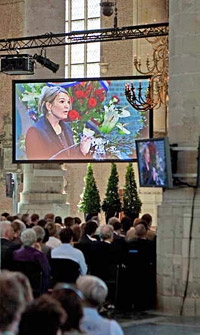‘LIBC Junior is bursting with new ideas’
How does the brain develop from birth up to adolescence? And why are young people given so little information about the development of their brain? Two new websites of the Leiden Institute for Brain and Cognition provide an answer.

Knowledge in society
On Monday 31 August, at the official opening of the 2009-2010 Academic Year, development psychologist and initiator, Professor Eveline Crone, presented the new websites and the LIBC's initiatives in the area of research and public information. Crone: ‘We don't regard our place as being in science on the one hand and in society on the other. LIBC scientists see science in society as an integral part of society.’
New scientific network
The first website is LIBC junior, a new and interdisciplinary scientific network that studies the developing brain. What makes people think and act the way they do, and how does the brain develop from birth to adolescence? Why does this complex and uneven development generally proceed so well, and why does it sometimes go horribly wrong? On the website, the researchers explain the what, why and how of their work.
Seven research labs
Seven research groups with their respective labs will be collaborating within LIBC Junior. They study the whole range of aspects relating to brain development: how does a child learn to talk and later to read? Why is the influence of secure bonding of a child with its parents so important for development, and what determines this bonding relationship? What exactly is autism?
Neuroscientific methods

University research profile
LIBC Junior correlates with two interfaculty research areas designated by the University last year as so-called research profile areas: the area of Brain function and dysfunction over the lifespan, where Leiden's brain and cognition research is concentrated, and the area of Health, prevention and the human life cycle, that charts medical, psychological and social risk and success factors from conception to extreme old age.
‘LIBC Junior is bursting with ideas,' is how Crone concluded her presentation on Monday 31 August.' 'Keep your eyes on us.'
Manageable
The LIBC Junior website is easily manageable for interested people who are curious about what we know or are still researching about the combination of the brain and the environment in the crucial phase of our development into the people we are today.
Website for young people
Look inside your brain is specifically intended for young people themselves, although Eveline Crone explains that 'young' is 'of course a flexible concept, so please do all visit the website.'
Strangely enough, she discovered, there is a lot of information for parents and teachers about the development of the brain in early and later adolescence - the group between 11 and 25 years of age - but there is very little information aimed at the youngsters themselves.
What is the right time for the CITO test?
Teachers regularly read abot the question of what is the ideal age at which do take the CITO test, or to choose a study, and parents now know that there are good scientific reasons why their children never want to get out of bed, but for the key person in this whole scenario there was precious little information. And requests for information are streaming every day in from this group asking for information for class presentations and essays.
Journey through the brain, with pictures
‘A journey through the brain with pictures,' is how Crone describes the Look inside your brain website, for which she engaged YoungWorks, a communication agency specifically for PR and marketing to young people. Surfing through the website, young people willtake a look inside their own brain and discover how the brain works, what scientists do every day, to find out more about it and what makes young people so unique.'
The website has links to:
- The brain
- The regions of the brain
- Myths
- Brain research
- Testimonials by researchers
- Games, tests and links for class presentations or essays.

Prior to the launch, researchers from Crone's laboratory organised a meeting with workshops, interviews and discussion groups for school pupils from the Leiden Pre-University College, a programme for talented and motivated pupils from the 5th or 6th year of high school that gives them te opportunity to take part in the world of science at an early age.
Links
- Text of the presentation by Eveline Crone at the opening of the 2009-2010 Academic Year (pdf) LIBC Junior
- Look inside your Brainn
- LIBC
